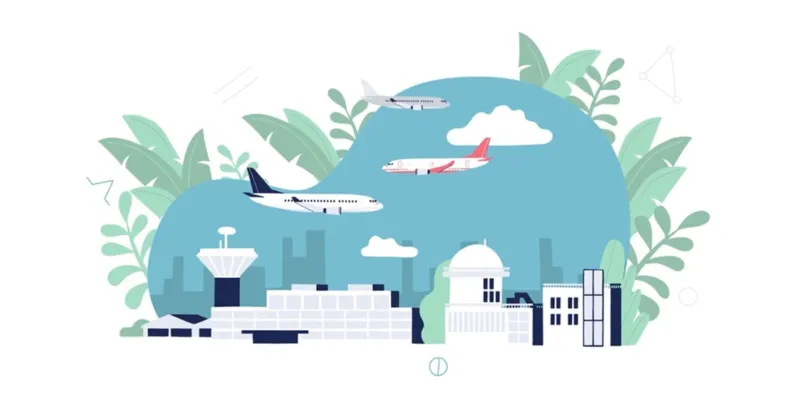 The air transport industry is fully cognizant of its impact on the environment and has undertaken to achieve net zero carbon emissions by 2050.
The air transport industry is fully cognizant of its impact on the environment and has undertaken to achieve net zero carbon emissions by 2050.
To step up to this global challenge, one of the most effective ways of delivering results in the short term is to optimise flight operations and to enable commercial airliners to select the most efficient flight plans by following more direct trajectories and adjusting their speed and altitude in real time.
It is estimated that these measures could cut CO2 emissions in Europe by about 10% from as early as 2025.
To prepare the groundwork for this undertaking, Thales, Air France, DSNA, ONERA, Atmosphère, CGX and Cerfacs joined forces on the Octavie project, with more than 700,000 euros in financial support from the Occitanie region, to test the Green Flag concept under operational conditions.
Under the Green Flag concept, developed for the Provert study by Thales, DSNA (France’s air navigation services provider) and Air France, air traffic control authorities can designate certain portions of airspace as Green Flag sectors during periods of moderate traffic.
Working in coordination with air traffic controllers, pilots in these sectors are then able to adopt the most eco-friendly practices by optimising flight parameters (route, altitude, speed) to minimise fuel consumption and cut greenhouse gas emissions. The concept relies on the use of collaborative digital tools to simplify interaction between pilots and controllers and guarantee the highest possible levels of flight safety.
After laboratory testing of prototype technical solutions, the Octavie project has moved into a new phase, conducting the first tests in real-life conditions on two Air France flights between Paris-Orly and Toulouse-Blagnac in March 2022.
The tests demonstrated the value of the Green Flag concept and its ability to reduce CO2 emissions while optimising altitude and distance. Thanks to easier interaction between the flight deck and air traffic control centres, controllers were able to maintain the aircraft at cruising speed for longer periods, and flight crews could adopt continuous descent approach procedures to reduce fuel consumption. These first flight tests produced promising results, which now need to be consolidated so that the Green Flag concept can be incorporated into air traffic control procedures at scale and on a permanent basis, even under dense traffic conditions.
“Thanks to the strong engagement of the project partners and the support of the Occitanie region, we have just cleared an important hurdle in the race to decarbonise aviation. The test results and the lessons learned have paved the way for optimised flow management, which will make it possible to reduce flight CO2 emissions by 10%,” said Yannick Assouad, Executive Vice President, Avionics, Thales.
“Decarbonising aviation is a key challenge for everyone involved in the air transport sector. The success of the Octavie project shows how crucial it is for all the stakeholders to work together to achieve realistic, ambitious and highly demanding CO2 emissions reduction targets like those adopted by Air France. Alongside its partners Thales and DSNA, Air France is contributing specialised expertise and resources to drive the innovations that will make air transport more sustainable,” noted Laurent Lafontan, Senior Vice President, Flight Operations Technical Development, Air France.
“DSNA is very closely involved in the ecological transition of air navigation and is delighted to have taken part in this project. The agency’s environmental strategy covers all flight phases and has a particular focus on safe flight path optimisation. The Octavie project has been a chance for us to explore new ways of working in the pre-tactical phase,” added Florian Guillermet, Director of Air Navigation Services, DSNA.
“The Occitanie region is the epicentre of Europe’s aerospace industry. It’s the birthplace of the green aircraft, and a few days ago we adopted a 100 million euro regional investment plan to support green aviation. We need to invest massively if we are going to stay on the leading edge of innovation, research, development and training. That’s why the Occitanie region is supporting projects like Octavie, which are helping to reduce the carbon impact of the aviation sector on the environment. I applaud the seven project partners for their work and for successfully combining their expertise to cross a new milestone in the ecological transition of the aerospace sector,” concluded Carole Delga, President of the Occitanie Region.
One project, seven partners
- Air France brings a combination of experience and expertise in airline operations, fleet management and flight operations. Its experts helped to define and develop the Green Flag concept, and the airline tested it jointly with DSNA and Thales.
- Atmosphère specialises in satellite connectivity for flight mission management and in-flight testing. As the leader of the air-ground communications component of the project, the company was in charge of designing and developing an autonomous end-to-end connectivity solution for pilot/controller communications during the tests. The Octavie project has been an opportunity to demonstrate the effectiveness of Atmosphère’s satcom solutions and collaborative tools and applications. The experts involved in the project have helped the company to move its products up the value chain at the same time as contributing to broader environmental objectives.
- Cerfacs, a CNRS associated research centre, specialises in modelling, numerical simulation and high-performance computing, in particular for aerodynamics and climate studies.
- CGX is supporting the project through its digital expertise, its disruptive approach to the publication of aeronautical data and its capacity to insert secure digital technologies into a real-time operational environment. For a number of years, CGX AERO has been helping flight operators to pursue a more virtuous growth trajectory while maintaining the necessary levels of safety and performance. The Octavie project is a clear illustration of how tactical collaboration via integrated digital tools can help to deliver operational gains in the short term.
- DSNA is the French air navigation services provider (ANSP). The agency provided resources for the simulation tests and took part in operational evaluation of the Green Flag concept.
- Onera is a research centre specialising in aerospace-related R&D, with a particular focus on the environmental impact of the aviation sector and on artificial intelligence methods and algorithms for decision support tools used by airlines and air navigation services providers. To achieve the crucial goal of carbon neutrality, the air transport sector needs to rethink its approach to aircraft propulsion, aircraft architectures, flight procedures, control infrastructure and flight operations. Onera provides time-honoured research expertise in all of these fields.
- Thales is providing expertise in flight avionics, air traffic management systems and simulation. The Group is in charge of defining and operationalising the Green Flag concept, and conducting and analysing tests in cooperation with the other project partners.
1 Octavie: Optimisation Collaborative du Transport Aérien Vis-à-vis de l’Environnement / collaborative environmental optimisation of air transport
About Thales
Thales (Euronext Paris: HO) is a global leader in advanced technologies, investing in digital and “deep tech” innovations – connectivity, big data, artificial intelligence, cybersecurity and quantum technologies – to build a confident future crucial for the development of our societies. The Group provides its customers – businesses, organizations and governments – in the defense, aeronautics, space, transport, and digital identity and security domains with solutions, services and products that help them fulfil their critical role, consideration for the individual being the driving force behind all decisions.
Thales has 81,000 employees in 68 countries. In 2021, the Group generated sales of €16.2 billion.
Featured image credited to Thales









